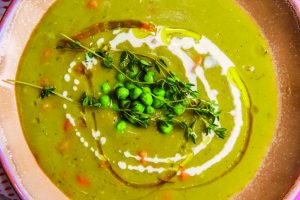DIVAS ON A DIME: The secret to buying organic produce on a budget
By Patti Diamond — April 27, 2023
This fast, frugal and healthy recipe features two Clean 15 ingredients. (www.JasonCoblentz.com)
As grocery prices continue to rise, you might be wondering how to prioritize your grocery budget when it comes to buying organic produce. The most helpful tool for making informed choices is the Environmental Working Group’s annual Dirty Dozen and Clean 15 lists.
The Dirty Dozen is a list of the top 12 fruits and vegetables that are most likely to contain high levels of pesticide residue. This year’s list includes strawberries, spinach, kale, nectarines, apples, grapes, peaches, cherries, pears, tomatoes, celery and potatoes.
The Clean 15, on the other hand, is a list of the 15 fruits and vegetables that are least likely to contain pesticide residue. This year’s list includes avocados, sweet corn, pineapple, onions, papaya, frozen sweet peas, eggplant, asparagus, broccoli, cabbage, kiwi, cauliflower, mushrooms, honeydew melon and cantaloupe.
It’s important to emphasize, just because a fruit or vegetable is on the Dirty Dozen list doesn’t mean that it’s unsafe to eat. It simply means that it may contain higher levels of pesticides than other items on the list.
The Environmental Working Group is a widely respected nonprofit organization that puts out these lists each year. They use data from the United States Department of Agriculture and the Food and Drug Administration to determine which fruits and vegetables are most and least likely to contain pesticide residue.
So, why should you pay attention to these lists? Mainly because buying organic produce is almost always more expensive than buying conventionally grown produce. By using the Dirty Dozen and Clean 15 lists, you can prioritize which produce items you should try to buy organic and which ones you can save money on by buying conventionally grown.
For example, strawberries are at the top of this year’s Dirty Dozen list. If you eat lots of strawberries, it might be worth spending a little extra money to buy organic strawberries to avoid consuming potentially harmful levels of pesticide residue. Meanwhile, avocados are at the top of the Clean 15 list. If you eat a lot of avocados, you can save money by buying conventionally grown avocados without worrying too much about pesticide residue.
Of course, it’s important to note that even conventionally grown produce is generally considered safe to eat. Additionally, you can further reduce your exposure to pesticides by washing your produce thoroughly before eating or cooking.
Here’s a fast, frugal and healthy recipe, featuring two Clean 15 ingredients: frozen peas and onion.
GREEN PEA SOUP
Yield: 4 servings
Total Time: 35 minutes
1 tablespoon olive oil
1 cup sweet onion, chopped
3 cups vegetable stock
4 cups frozen peas
To serve: sour cream or Greek yogurt and green onion
In a large saucepan, heat the oil, then add the onion and cook on low heat for 5 minutes until softened but not browned. Add the stock, cover, and cook for 5 minutes. Stir in the peas, bring it back to a simmer and cook for 5 minutes, or until the peas are cooked. Puree the soup in batches in a blender or blend with an immersion blender. To serve, get fancy pants with artistic swirls of sour cream or plain Greek yogurt and top with copious amounts of green onion.
To sum up, it’s important to prioritize your grocery budget when it comes to buying organic produce. Don’t let your budget discourage you from eating fruits and vegetables. Eating conventionally grown produce is still much better for your health than not eating any produce at all.
***
Lifestyle expert Patti Diamond is the penny-pinching, party-planning, recipe developer and content creator of the website Divas On A Dime — Where Frugal, Meets Fabulous! Visit Patti at www.divasonadime.com and join the conversation on Facebook at DivasOnADimeDotCom. Email Patti at divapatti@divasonadime.com
© 2023 King Features Synd., Inc.







